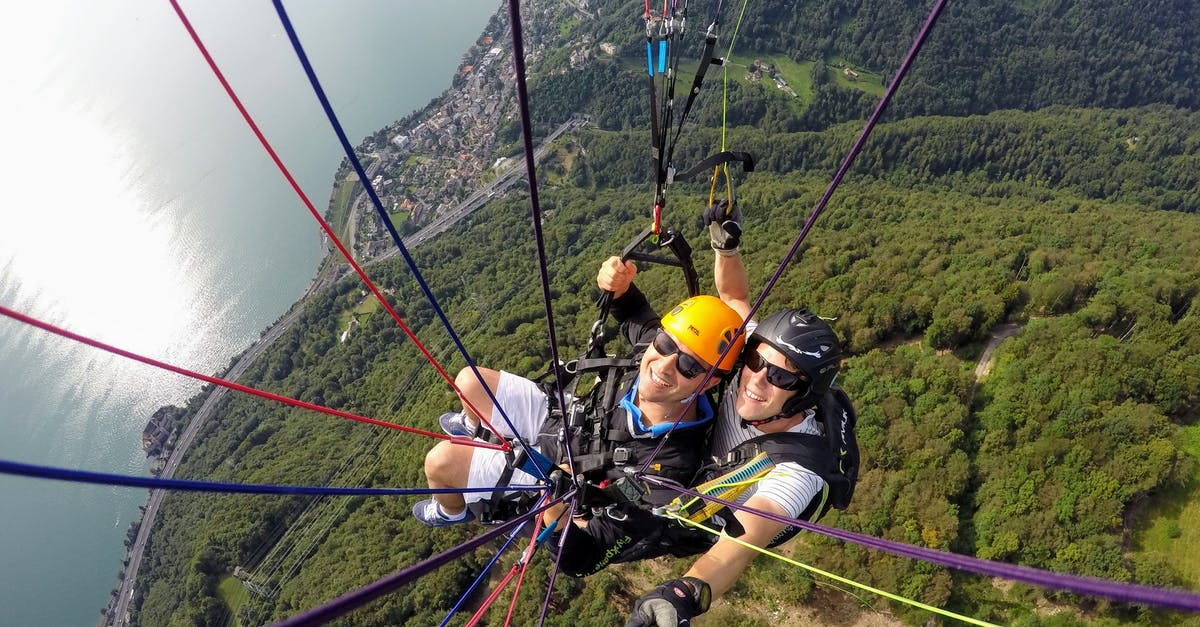What are the drawbacks of taking TWO (unconnected) indirect flights?

I will shortly explain my situation. Assume that I am from a country that has very few countries without visa (Developing country) and I want to travel from Paris (France) to Adelaide (Australia). Then I have to book a flight from Paris to Adelaide. The distance is big so the flight will be indirect. But at this point I have many choices. Let's entitle them A, B, C ...
Option 1 / A :
I can go to the website of a company (For example British Airways) and type Paris as the origin and Adelaide as the destination. Then I will have a connected indirect flight : Paris->London, London->Singapore, Singapore->Melbourne, Melbourne->Adelaide. The price will be (for indication) 1400-1500 € (round trip).
Option 2 / B :
I can go to a flights comparison website (like "jetcost" or "kayak") and search for two indirect flights to make my complete flight : 1st : Paris->Singapore (via London) with British Airways : The price will is ~ 480€ for indication. 2nd : Singapore->Adelaide (via Sydney) with an australian (more local) company : The price will be like 500€ for indication.
Then come my questions :
What are the advantages or drawbacks of chosing options A or B ? Has anyone traveled for long travels like that before and can share some experience ?
Here are the advantages and drawbacks I have found (Please tell me also if what I found is false or true) :
If I chose option A, I will have ONE indirect flight but managed by only one company : British Airways (even if the Singapore->Adelaide can be taken by another company like Qantas Airways). But, anyway, British Airways will guarantee that I can take all the flights and if there is some unexpected long flight delay, they will take me to my final destination anyway, without any charge for me. Also, British Airways will ensure that my bags are following me in my consecutive flights without the need of thinking about it for me. I won't need a visa neither for london, nor for singapore : Only for my final destination : Australia. The only drawback of choice A I found is the price : It is 400-500€ more expensive that choice B !
If I chose option B, I will have TWO indirect flights : The 1st one and the 2nd one. Both are managed by a different company (British and Austalian). Then, I won't have the guarantee to reach my final destination (if the first flight is delayed and I can't take the second, I can find myself blocked at Singapore airport with the obligation to take a new flight (really really expensive). Also, as the flights are unconnected, I will have to take my bags and register again at singapore airport ! Then my question is : Do I need a Singapore visa for this situation ? Even if my final destination is Australia, knowing that the second flight is booked separately from the first one. The main advantage for choice B is that it is reaaally cheaper (I can save 500€, which is not insignificant).
Finally, ...
What would you chose if you want to save money but you also want to be sure to reach your destination without any unexpected problems (delays, bags, cancellation, ...) ? Also do you think it is worth it to save 500 € and to chose option B ?
Important : The price difference can be more significant if, like me, you want to avoid south-asian low-cost carriers and privilege more reputed companies like British Airways, Emirates, ...
Best Answer
Usually, when you purchase two flights, A->B and B->C separately you will have to collect your checked-in baggage at B and re-check it for the flight to C. This almost invariable requires you to have the right to enter the country that B is in.
There are exceptions to this, some airlines have interline agreements (notably if part of the same 'alliance'). Even then the check-in staff at A may (erroneously) refuse to check your baggage through leaving you with few good options.
You can, of course, travel with carry-on only. That then raises the question of whether the airline that operates flight A->B will allow you to board the flight if you can not legally enter B. You can certainly show the onward ticket, but it will be a risk. Even if the staff is supposed to allow you to board, they may (erroneously) refuse you.
And that's not even getting into the headache of what happens if the first flight is delayed and you miss the second one. Buying a new ticket at the last minute at B either onward to C or back home to A may be hugely expensive.
You have to weigh the security of a single ticket against that 500 euro saving. With a single ticket you will get to C (even if it is a day or two late) at no extra cost. With two tickets there are all the risks discussed.
Is 500 euro worth risking it? Only you can answer that.
Pictures about "What are the drawbacks of taking TWO (unconnected) indirect flights?"



Can you book two separate airlines?
There are two different types of connecting flights. There are those that are included as one route on your ticket and scheduled by the airline or OTA, and then there those which you plan yourself and book separately, known as self-connecting flights.What happens if you double book a flight?
If you have purchased an airline ticket for the same person on two different sites, you must contact the airline immediately. Then you need to request to cancel one of them. Most airlines will get this done without any financial compensation.What is it called when you have to take 2 flights?
When a flight itinerary requires a traveler to change planes, taking two or more flights to get from the departure city to the destination, the flights are called connecting flights.What happens if I buy a round trip ticket and only use one way?
Can I buy a roundtrip ticket for a one-way trip? Technically, you can buy a roundtrip ticket and only use it to go one-way, but airlines frown upon this. And, you can only skip the return flight. If you miss a segment of your trip, the airline may cancel the rest of your ticket without giving you a refund.What is the difference between a layover and a connecting flight?
More answers regarding what are the drawbacks of taking TWO (unconnected) indirect flights?
Answer 2
It really depends on which companies you pick to fly with in option two.
Option 1 will, as you say, almost certainly guarantee you another equal flight should something happen at some stage of your journey which causes you to not make your connection.
Option 2 however is largely dependant on which companies you use to fly your different legs with.
- If you choose to fly Low Cost Carriers (LCCs) then you have no support at all.
- If you fly alliance partners (Oneworld, Star Alliance etc.) for both legs of your trip, it is highly likely that delays on the first leg will be supported by the other airline (as is usually the case with at least British Airways and QANTAS).
- It is also of note that if both legs are flown by different airlines that have a codeshare agreement, it is often the case that the codeshare partner will support you should you suffer delays with your first leg. (There are cases where non-alliance members codeshare flights).
- A further note is that in the case of extreme and extenuating circumstances (such as major natural disasters) some airlines will support you regardless of who your first leg was flown by. [I had automatically reassigned tickets when flying All Nippon Airways (a Star Alliance Partner) coming from a 13 hour delayed QANTAS flight (Oneworld Alliance) the day of the 2011 Tohoku Earthquake and Tsunami in Japan. It didn't cost me anything either].
You also need to remember that in the event that the two different airlines you fly are not either codeshare or Alliance partners, you will need to collect and re-check in your baggage at your stopover point (be aware baggage allowances may also be different between each of the airlines you choose hence you may have to forfeit, send or pay extra for your luggage at your stopover).
You do not need to have a valid visa for entry to a country when you are in a transit situation, however, as you would be re-checking luggage (in option 2), some airports may request you get a transit visa at the minimum as the check-in area is outside of the "sterile" (read: secure) zone (some airports don't require this as you can collect your baggage before the customs check and go to a transit / help counter for the corresponding airline you will be continuing your next leg on).
Also, you need to consider that your flight may not (and in most cases will not) necessarily be delayed at all (but it is always good to consider it being delayed as part of your travel plans).
Further, if you want to fly cheap, consider when the off-peak season is. Going in or around major holidays in either your departing or arriving country is going to push up the price of your ticket by up to 200% of an off season fare (sometimes even more).
COMPARISON
Pros
Option 1 : Baggage will arrive at final destination without you needing to do anything passed the initial check-in. If lost or rerouted, the airline will usually offer some kind of temporary compensation until your baggage arrives (at least if you claim under Australian Consumer Law). If delayed, will be moved to next available flight and/or accommodation / food provided for (if the airline is at fault and the delay is overnight/a considerable number of hours). Can use the lounge of the airline at all ports of call (that a lounge for said airline exists) if you are a member of one of their programs that grants lounge access (or is some instances pay for the privilege as a one off).
Option 2 : (Alliance) - Will in most cases be similar to option 1 excepting the price of the ticket(s) being cheaper, however compensation may not be provided unless your baggage is declared as lost). If delayed, will usually be moved to next available flight with the same airline as your second leg. Can use the lounge of the first airline (until initial departure) if you are a member of one of their programs that grants lounge access (or is some instances pay for the privilege as a one off) and the second airlines lounge at the stopover point (subject to the same conditions of entry).
(Codeshare) - Once again similar to option 1 excepting the price of the ticket(s) being cheaper, however compensation may not be provided unless your baggage is declared as lost). If delayed, will usually be moved to next available flight with the same airline as your second leg (though in some cases the airline of your first leg may offer an alternative). Can use the lounge of the first airline (until initial departure) if you are a member of one of their programs that grants lounge access (or is some instances pay for the privilege as a one off) and the second airlines lounge at the stopover point (subject to the same conditions of entry).
(Unrelated Airlines / Other) A cheaper ticket. Can use the lounge of the first airline (until initial departure) if you are a member of one of their programs that grants lounge access (or is some instances pay for the privilege as a one off) and the second airlines lounge at the stopover point (subject to the same conditions of entry).
(LCC) A "much" cheaper ticket.
Cons
Option 1 : A more expensive ticket.
Option 2 :
(Alliance) Until returned or declared lost, rerouted or temporarily misplaced baggage will not normally have any compensation awarded. Accommodation and/or food for delayed flights will most likely not be provided if you are moved to a new flight. Some airlines will make you pay a (usually) small nominal processing fee to change your flight time.
(Codeshare) As with Alliance, until returned or declared lost, rerouted or temporarily misplaced baggage will not normally have any compensation awarded. Accommodation and/or food for delayed flights will most likely not be provided if you are moved to a new flight. Some airlines will make you pay a (usually) nominal processing fee to change your flight time.
(Unrelated Airlines / Other) A cheaper ticket. until returned or declared lost, rerouted or temporarily misplaced baggage will not normally have any compensation awarded. Accommodation and/or food for delayed flights will most likely not be provided if you are moved to a new flight. Some airlines will make you pay a processing fee to change your flight time.
(LCC) It is an LCC. Expect smaller leg room, having to pay for food and drinks, long toilet lines and stringent baggage weight checks for all of your baggage (and exorbitant fees for any excess). If you miss your flight, the connecting LCC will usually make you buy a whole new ticket. LCC's do not usually have lounges and any delays you may face will usually have no compensation at all awarded. Lost baggage is still subject to the same rules as other bigger airlines concerning baggage loss and as such until returned or declared lost, rerouted or temporarily misplaced baggage will not normally have any compensation awarded.
Answer 3
As said, it depends on you if you want to take the risk for 500 EUR. But the risk with self-connected flights (=two tickets) also depends on the exact situation.
I did this in May 2015 with a stopover in Dubai (DXB), but I was sure to get a free 30 day visa on arrival in Dubai if I'd need it (I did), and I had planned with a lot of stopover time. In case of getting "stuck" in Dubai, I would simply stay there for some days in a hotel, since I had no time pressure either. In that situation, the "risk" was acceptable to me, and I'd do it again to beat crazy airline fares :-)
Your case may be different. But here are some options to help you minimize the risk on self-connected flights:
- Use long stopover times. I did the two-ticket trick once and had 12 hours stopover intentionally. This will allow for a lot of delays without missing the connecting flight, but it's still a risk of course.
- Make sure potential replacement flights arrive in time. Check the timetable of the airline operating the last leg of your first flight. If they have another flight some hours later, and that falls within your stopover delay, it gives at least some assurance in case flights get delayed / cancelled.
- There may be a baggage pickup & transfer service at your stopover airport. If so, you can get your baggage transferred without needing a tranfer visa to do that yourself. I don't know if Singapore Airport has this. Dubai International Airport (DXB) has this, for example. It is called "Marhaba Services" in the transit area and among other things offers to pick up the luggage of transferring passengers and checking it in again to their next flight. Costs 84 USD though (in May 2015). Others recommended to find the Dnata transfer desk (Dnata is the ground handling company at DXB), which would offer this service for free, but I could not find such a thing.
- There may be a transfer visa available. Some countries issue special transfer visas (valid for 24 - 48 hours normally), perhaps you can get one to collect your baggage and check in again, even if you can't get a normal tourist visa.
- Maybe ship your bags as parcel instead. Flying with checked-in baggage on self-connected flights where you don't want to or cannot get a visa at the transfer airport is a hassle, esp. when bags are delayed or misrouted. I had to deal with a lot of clueless airline service personnel and wrong info on their websites :D Personally, I'll travel on self-connected flights again, but I will usually ship the checked-in baggage as a parcel instead …
Another thing about transfer visas is that some countries technically require you to get one for longer stays within the transfer area ("airside" in the airport). Longer than 14 hours in one case I remember. But since this is hard to be checked in practice, you could take the risk and stay for a bit longer without this if you are not eligible for a transfer visa. Your risk, of course.
Answer 4
I have a suggestion of option C (which I have done before in a different country): travel to a large hub and fly directly from that hub.
In your case, you could obtain a visa to enter the UK, take a low cost bus from Paris to London and then fly directly from London to Sydney or Melbourne and then take an domestic flight to Adelaide.
This would reduce the amount of countries you may find yourself stuck in.
Answer 5
I have done A-B one ticket, B-C other ticket several times, for very long haul flights. Australia-Hawaii-Canada, Europe-UK-Canada, that kind. I always look up what's the next flight after mine on A-B and only buy B-C presuming I will be on that one. There's still risk but lower. This might involve a hotel in B as well which lowers the savings. However, the savings in my case is so huge (because I am pairing a business class ticket with an economy on a low cost carrier) it was never a question.
Answer 6
I did it twice, no delays, but some fright for delays. always a cheap second ticket with several options to buy another second ticket cheap. I used skyscanner to see the benefits.
Sources: Stack Exchange - This article follows the attribution requirements of Stack Exchange and is licensed under CC BY-SA 3.0.
Images: Inga Seliverstova, Selmon Bajramaj, Ivan Samkov, olia danilevich
